17 foods that should and shouldn’t go in the fridge
'Fridge or cupboard' debates have torn households apart for generations. From ketchup to chocolate, we've put together the definitive guide to where you should be storing your food.
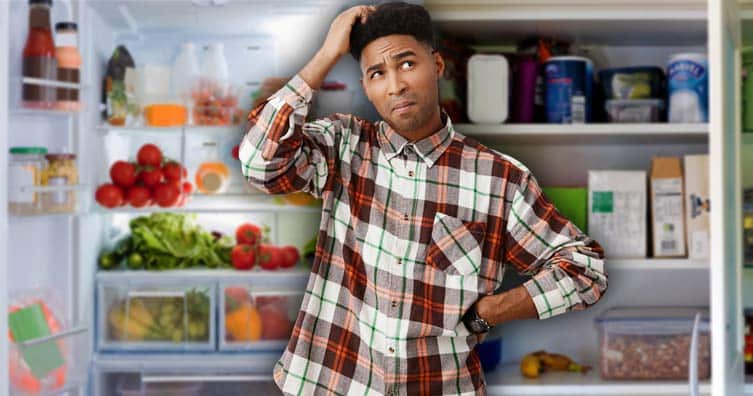
Credit: Andrey_Popov (left), RogerMechan (right), Cookie Studio (foreground) – Shutterstock
Some foods have an obvious home. For instance, we all know that cereal goes in the cupboard, and meat goes in the fridge.
But should eggs go in the fridge or the cupboard? What about bread? And, dare we even ask, where are you meant to store tomato ketchup?
To help you become a culinary master, we've listed all of the most controversial 'fridge or cupboard' foods. And, of course, when we say 'cupboard', there's nothing to stop you from using the kitchen counter or a fruit bowl instead. It's time to settle some arguments.
Which foods should go in the fridge?
Here are some common items that should go in the fridge, as well as foods that don't need to be refrigerated:
-
Tomato ketchup
Tomato ketchup should be kept in the fridge.
For as long as tomato ketchup has existed, families have argued over whether it should be kept in the fridge or the cupboard. In fact, it's possibly the original source (pardon the pun) of the 'fridge or cupboard' conflict.
Fortunately, as with all ketchup-based problems, the good people at Heinz have the answer.
According to them, while tomato ketchup's natural acidity means it's safe to keep in the cupboard, you should store it in the fridge as soon as you've opened the bottle. This will help it "maintain the best product quality".
And the same goes for mayonnaise, too – cupboard before opening, fridge afterwards.
-
Eggs
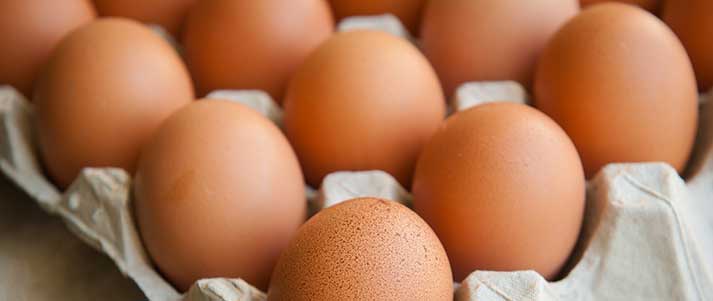
Credit: siambizkit– Shutterstock
Eggs should be stored in the fridge.
In the supermarket, eggs are kept on the shelf. But in your fridge, there's almost certainly an egg tray. So, where are you meant to store your eggs?!
Well, if we're going off the advice of Egg Info, the official voice of the British egg industry, you should be keeping your eggs in the fridge.
They recommend that you store your eggs at a constant temperature below 20°C. As room temperature can vary drastically throughout the year (and sometimes even in a single day), the best place in a domestic kitchen is the fridge.
Interestingly, they also suggest that to avoid any sudden temperature changes that may damage the eggs, you should also take them out of the fridge about 30 minutes before cooking. Every day's a school day.
-
Bread
Bread should be stored in the cupboard.
Think the fridge will always extend the life of your food? Think again.
We won't go into the science of it all, but experts agree: bread goes off faster in the fridge. So, you're best to leave it in the cupboard in an airtight bag (i.e. the bag it comes in, with the little tag firmly sealed).
That said, there is a way to keep it alive for even longer. Bread can be frozen for months on end and each slice will take less than an hour to defrost. Your freezer is the perfect place to store bread if you don't think you can devour an entire seeded loaf (objectively the best variety) in a week.
-
Avocados
Avocados can be stored in the fridge or cupboard – depending on how ripe they are.
When they're not spread on your toast or smashed up in a homemade beauty treatment, where should your avocados be stored? The answer depends on how ripe your avocado is.
Firstly, to test the ripeness of your avocado, give it a gentle squeeze. If it's slightly squishy and has dark green/black bumpy skin, it's ripe. Anything else, and it's probably not ripe.
Now for the storage. Ripe avocados should be stored in the fridge for two to three days to keep them fresh. If your avocado isn't quite ripe, leave it out on the counter for a few days, checking it each day to see how it's progressing. As soon as it's ripe, put your avocado in the fridge!
And if you're looking for a way to keep your avocado fresh after it's been cut open, see our food-storage tips.
-
Bananas
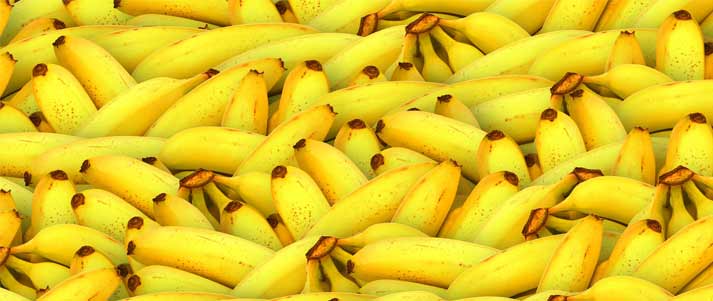
Bananas should be stored in the cupboard.We all know that frozen bananas make for a great snack (ok, we didn't all know that, but now you do). But when they're not ice-cold, should they be kept chilled instead? No.
As seems to be the case with most tropical fruits, bananas don't fare too well in the cold. The enzymes that help them to ripen are stifled in the fridge, so it's best to keep them at room temperature if possible.
This is especially true if they're green (which we've found is usually the case if you get bananas in an online shopping order). This means they haven't ripened yet.
And remember, a brown banana is not a bad banana. For ideas on how to use them, see our guide to foods you can eat past their best.
-
Chocolate
Chocolate can be stored in the cupboard or the fridge.
Nothing – and we mean nothing – has ever divided the Save the Student office quite like the debate around where to store chocolate.
On the one hand, we have the scholars – the progressive thinkers, unchained by societal conventions. They believe certain chocolates should be kept in the fridge as it gives them an added snap, enhancing the already euphoric chocolate experience.
On the other side of the debate, we have the purists – the devotees, unwilling to change their ways. That's even when faced with the sad reality of soft, semi-melted chocolate.
Cadbury has previously said chocolate should be stored in a dry and dark place (e.g. a cupboard) at a temperature below 21°C. However, there are also studies to suggest that as long as it's kept in an airtight container, chocolate actually lasts longer in the fridge without any loss of quality or taste.
So, in an unprecedented move, we'll leave it down to you to decide where to store your chocolate.
-
Tomatoes
Tomatoes can be stored in the fridge and cupboard – depending on how ripe they are.
As a salad vegetable (yes we know it's actually a fruit...), you'd expect tomatoes to go in the fridge. But it seems as though this may not be the best plan after all.
Like most fresh fruit and veg, tomatoes that you buy in the supermarket usually aren't ripe yet. This ensures that they last for as long as possible in the shop and your kitchen. And, for tomatoes to ripen properly, they need to be stored at room temperature – in other words, not in your fridge.
Unripened tomatoes are far less flavoursome than their ripened red counterparts. So, for the sake of your tastebuds, keep them in the cupboard or on the countertop. The only exception should be if they're already ripened and you want them to stay that way for a couple of days.
And, of course, you can even grow your own tomatoes!
To save money on energy bills, set the fridge no colder than 5°C. Likewise, it helps to set the freezer no colder than –18°C. -
Potatoes
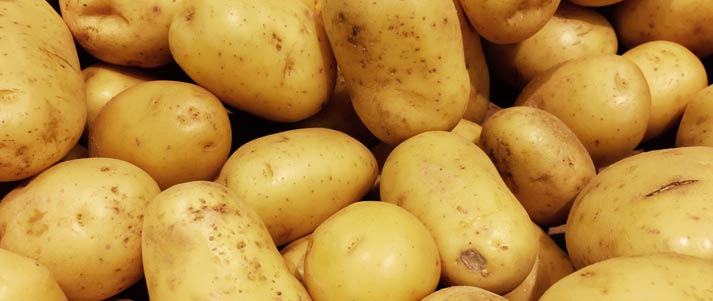
Credit: Titus Group – Shutterstock
Potatoes can be stored in the cupboard or the fridge.
Ah, potatoes. That most versatile of vegetables, capable of being repurposed for just about any meal, healthy or otherwise. But where should you store them?
The Food Standards Agency previously advised against storing raw potatoes in the fridge. It had been thought this could cause additional sugars to form that then converted into acrylamide when the potatoes were cooked. Acrylamide causes cancer in animals and may be harmful to humans' health too.
However, a recent study has found that storing potatoes in the fridge doesn't increase the risk. So, now the official advice is that you can store potatoes in either the fridge or in a cool, dry place. Find out more on the Food Standards Agency's page about acrylamide.
-
Butter
Butter should be stored in the fridge.
Now, there's no denying that the softer butter is, the easier it is to spread. But is that enough reason to keep it out of the fridge? Apparently not, according to Dairy UK.
The voice of the UK dairy industry has been quoted as saying that butter should be kept in the fridge and nowhere else as, otherwise, it'll go off within a few days.
While it may still be safe to eat (note: there's a chance it won't be safe!), it's unlikely to taste as good as in-date butter. So, either keep your block in the fridge or take a slice off and only warm up as much as you need each day or two.
-
Onions
Onions should be stored in the cupboard.
Is there a more underrated food than onions? Seriously, think about just how many dishes contain onions. It's almost harder to think of a recipe that doesn't use them. Our student meal plan uses over a dozen of them for a month's worth of food.
If you want to keep this staple ingredient fresher for longer, keep it in the cupboard. Storing onions in the fridge can cause them to become soft and soggy a lot quicker than they otherwise would, and that's just a waste of a good onion.
And we have more tips on how to keep food fresh for longer, including your beloved onions.
-
Garlic
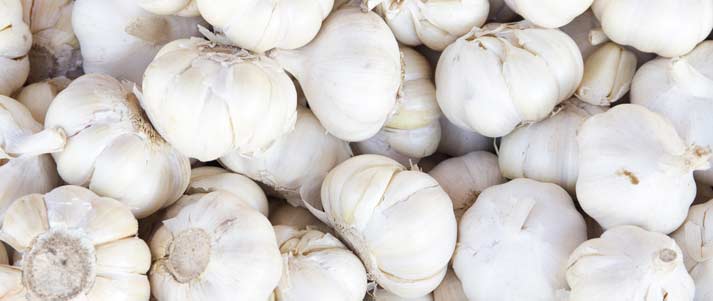
Credit: Davedeka – Shutterstock
Garlic should be stored in the cupboard.
Like onions, garlic is a lynchpin of so many of your favourite dishes – especially a good bowl of pasta.
Stored at room temperature in a dry (and, preferably, dark) environment, garlic should last for a few months. But keep it in the fridge and it could go mouldy or start sprouting within just a few weeks.
-
Apples
Apples should be stored in the fridge.
There are few things in life greater than the first bite of a crunchy apple. So, if you want to keep your Granny Smith, your Pink Lady or, indeed, your Golden Delicious in tip-top condition, keep them in the fridge.
Apples hold their moisture best when kept in a cold, dark environment, and you're most likely to keep them fresher for longer if you leave them in the plastic bag they came in (as long as it has a couple of holes in it).
-
Peppers
Peppers should be stored in the fridge.
Whether it's a Thai green curry or a set of enchiladas, peppers are a guaranteed way to add colour and flavour to your dish.
To ensure peppers don't lose any of their magic, keep them in the fridge. If they came in a plastic bag, don't discard it. This will help regulate the moisture levels of your peppers, which in turn keeps them fresh for as long as possible.
And, as with so many fruits and vegetables, you should keep your peppers in the salad drawer at the bottom of your fridge. This also helps to maintain the correct moisture level for your greens.
-
Lemons

Credit: Radu Bercan – Shutterstock
Lemons should be stored in the fridge.
When life gives you lemons, do whatever you can to keep them ripe – which, according to the experts, is to keep them in the fridge.
While lemons will still be perfectly edible if you keep them in the cupboard, they'll only stay that way for about a week or so. Stick them in the fridge, however, and your lemons could last for up to a month.
A month should be more than enough time to use your lemons in whatever recipe you've been planning. But if you're up against the clock, it's worth knowing that you can use lemon juice to keep avocados fresh too.
-
Cake
Cake could be stored in the cupboard or the fridge, depending on what type it is.
When it comes to cake, there's no greater authority on the subject than The Hummingbird Bakery. Honestly, if you haven't tried their cakes, get involved.
According to Hummingbird, whether or not your cake should go in the fridge depends on what kind it is. If your baked beauty contains any type of cream, custard, cream cheese or fresh fruit, you really should be refrigerating it. This way, it'll last for a few days (assuming you don't devour it on day one).
On the other hand, cakes with sugar paste, fondant or food colouring should be kept in the cupboard, as the fridge could cause the colours to bleed.
And if you're blessed with the willpower of a saint, and don't think you'll finish your treats within a few days, remember that cake can even be frozen without losing much of what makes it so great.
-
Jam
Jam should be stored in the fridge (if opened).
Although you can keep unopened jars of jam in the cupboard, they usually need to be kept in the fridge after being opened.
To get an idea of how long the jam will stay fresh after being opened, check the guidance on the jar.
There are some conflicting views on where to store jam, with some saying it's fine to keep opened jars in the cupboard.
However, Hartley's says on their website that they recommend keeping jam in the fridge once it's opened because modern homes are much warmer than they used to be. Because of this, jam might go off more quickly if you keep it in the cupboard.
-
Oranges
Oranges should be stored in the fridge.
Unlike most other fruits, oranges are usually perfectly ripe when you buy them. While this is great news if you're looking to chow down on some citrus ASAP, it's not so good for the shelf life of your oranges.
Although oranges are a well-known source of vitamin C, once ripened, the level of this essential compound starts to decrease. Popping your oranges in the fridge will slow this process, and in turn keep them fresher, juicier and healthier for longer.
What better way to stock your fridge (or your cupboard, for that matter) than with all of the free food you can get with our tricks?








